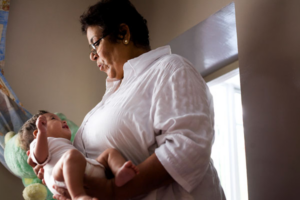$1 Million Winner
CASABLANCA, MOROCCO – Adjou Kebab steps into her one-room house in the El Hank slum neighborhood of Casablanca, Morocco, a bare light bulb hanging overhead. The room is no bigger than an ice house. She motions for her guests to have a seat and makes ready to serve the lunch she has prepared.
Suddenly screams split the air. A fight between children escalates. One man wields atwo-by-four, waving it over his head, threatening the mother of one of the children.Kebab steps outside, hollers something in Arabic and – with a gleam in her eye and thattone in her voice – says not to worry, things will settle down shortly.Kebab is right about the fight. In 10 minutes the squabble is history, and she servesthe fish, vegetables, peppers and couscous she’s prepared. The temperature in theroom is at least 100 degrees, and the air is still. But Kebab is sharing her table, giving up her seat and, yes, presiding over lunch.Her daughter, Dounia, is also at the table, along with her friend. And even though the 17-year-old is doing well in school, passing her TOEFL exam and making plans to be a cop, her mother is still running the household.This is the same woman who came to the door of Association Solidarité Féminine (ASF) and its founder Aïcha Ech Channa 17 years ago when she was 16 – an unmarried mother. She was angry, alone and ashamed. She needed friends, someone to care for her child, and she needed a skill, a way to earn a living. She got all of that, and more, from ASF and the woman who founded it in 1985.
Ech Channa is to the struggle for human and civil rights for single mothers and  theirchildren in Morocco what Martin Luther King was to the fight for racial equality in theUnited States. She has achieved near-iconic status in Casablanca, providing services tothousands of mothers and their children.
theirchildren in Morocco what Martin Luther King was to the fight for racial equality in theUnited States. She has achieved near-iconic status in Casablanca, providing services tothousands of mothers and their children.
“She was among the very first to speak out on a taboo subject (unwed mothers andchildren),” says Dr. Driss Moussaoui, an old friend and colleague, who chairs thePsychiatry Department at Ibn Rochd University. “She developed a sacred anger on behalf of these women and their children.”
Ech Channa operates three day care centers and training schools, two restaurants,four kiosks and a hammam (fitness center and spa). She’s received money and supportfrom the Moroccan king, Mohammed VI. And on Nov. 4, 2009, she was honored by theUniversity of St. Thomas and the Opus Prize Foundation, receiving $1 million from thefoundation to further her work.
That Ech Channa, 68, should involve herself in a battle for women’s rights is not surprising. When she was 12, her stepfather decided she had had enough school, and should stay at home, wear the djellabah (a hooded robe) and veil and learn to sew.
Her independent mother said no and sent her to Casablanca to live with an aunt and continue her schooling. She graduated from nursing school and, in 1959, volunteered in a program to protect children. It was while she was working in the Moroccan Ministry of Public Health in the 1980s that she saw firsthand the consequences for a mother and her child born out of wedlock.
Ech Channa was a social worker, just back from maternity leave (she has four children). She happened by an office next to hers where a young girl was breastfeeding her baby. The social worker gave the mother a paper to sign and then reached out to take the child; it was customary for the agency to take the babies from unwed mothers and place them for adoption or put them in orphanages.
Ech Channa recalls that the girl had the rounded, stooped shoulders she’d come to  recognize as a sign of shame. When the social worker pulled the baby from the nursing mother, her breast milk squirted onto the face of the baby, who began to cry.
recognize as a sign of shame. When the social worker pulled the baby from the nursing mother, her breast milk squirted onto the face of the baby, who began to cry.
“I can never forget that moment. It was 5:30 in the afternoon,” she says. “When I got home, I couldn’t get that picture out of my mind. And I couldn’t sleep that night. I knew I had to do something.
“I had seen enough to know of the extraordinary suffering of these young girls who became pregnant. They were kicked out of the families, shunned by society, labeled as prostitutes and left to wander the streets. They were not bad girls; they were victims.”
Ech Channa started ASF with a handful of volunteers, in the basement of a building they dubbed “Le Cave.” Everyone was a volunteer, and the first service the newly formed ASF offered was day care for the babies.
Today ASF has a budget of $500,000 a year and a staff that has grown from 10 volunteers to more than 30 employees including a program director, an assistant manager, trainers, daycare workers and teachers. The organization also pays for the services of a psychiatrist and psychologist.
The ASF staff and its restaurants, kiosks, daycare/education centers and hammam promote three programs. The first is a support center that helps mothers to contact their families, to see whether reconciliation is possible; encourages mothers and families against abandoning the babies; offers medical services and psychological support; and provides administrative and legal counseling.
The second program is rehabilitation and education that teaches the often-illiterate mothers to read and write and understand the basic structure of the country’s government and legal system; trains them in such basic skills as cooking, baking, sewing and simple business management; and creates income for the mothers in the program and provides revenue to support ASF.
The third program is the day care. But the goal goes beyond simply taking the babies off the mothers’ hands while they are getting schooling or job training. The program counsels the mothers on how to better care for their children, giving them nurture and proper hygiene.
From January 2003 through September 2008, more than 1,000 men and women and 3,000 mothers received help at ASF’s listening centers, mostly referrals to organizations that could provide the appropriate help or service. In the same five years, 215 young mothers and 218 children were part of the intensive rehabilitation and training program. Some stayed in the ASF program for up to three years.
The statistics are impressive; so are the mothers and children who give faces to the numbers. Kebab, who drives a truck for the city of Casablanca, and Dounia are ASF “graduates” of the ’90s. Saadia Taibi and her six-year-old son, Yassir, came to ASF in 2003. “Until I got there, life was very hard. When I was pregnant, I was on the streets,” Taibi says. With Ech Channa and ASF, Taibi got the training she needed without having to worry about who would care for Yassir during the day.
"With Mrs. Ech Channa I got experience, confidence and gained a family."
Taibi developed a knack for management and runs one of the four kiosks, selling her pastries, juices and bars with an impressive combination of business sense and street savvy. Her son is doing well in school, and she’s quick to pull out his picture at the slightest provocation.
“I used to be scared, afraid to try new things,” she says. “With Mrs. Ech Channa I got experience, confidence and gained a family.” Taibi has enough confidence to hope of one day soon owning her own kiosk.
Bouchra Himri, 18, is at ASF working on the basics: reading, writing and learning to cook. She arrived in 2008, four days after her son, Yahya, was born. She wandered the streets with him for a day and a half before a woman referred her to Ech Channa. “A lot of things have improved for me,” she says. One of them was getting back in touch with her family.
Ech Channa has hundreds of testimonials, dozens of public supporters and even recognition and cash from an international women’s club. But she’s had to survive her critics, some of whom have been public, persistent and punitive.
“She’s been accused of supporting prostitution by some,” says Boubker Mazoz, of the American Consulate General’s office, who has known Ech Channa for more than 20 years. “I recall that someone in a radio interview even called for her to be stoned.”
Years ago, Ech Channa sought help from another friend, Moussaoui, the psychiatrist. “She told me that if any authorities ever tried to arrest her, I should just tell them she’s crazy, that she doesn’t know what she’s doing,” he says. “Well, of course, it’s just the opposite.
“If even a single mother is a human being, this means that all women are human beings. And this is the real gift of Mrs. Ech Channa to Moroccan society and to Arab society, and to Islamic society at large.”
In 2004, Morocco’s parliament and king combined to reform the country’s family code, granting more rights to women, including single mothers.
Ech Channa points out the law may have changed, but its effects are only going to be apparent when the hearts and minds of those who must enforce it are changed; she says there are still too many double standards, too many young women stigmatized and ostracized. Her spirit is willing for the struggles ahead, although she’s battled leukemia in recent years. “I accept my cancer,” she says, “but I won’t let it define me. I want to continue this work and to know that I survived for a reason.”
Kebab and her daughter are very much a part of that reason. “I came to her and she gave me strength and hope,” says Kebab. “Now my life is to give a better one to my daughter.”
About the Opus Prize: St. Thomas and the Opus Prize Foundation of Minnetonka, Minn., collaborated to identify the honorees, recognized as unsung heroes who are transforming lives through a commitment to service and social entrepreneurship. They will use the award money from the foundation to further their faithbased humanitarian efforts. Find out more at www.stthomas.edu/opusprize




